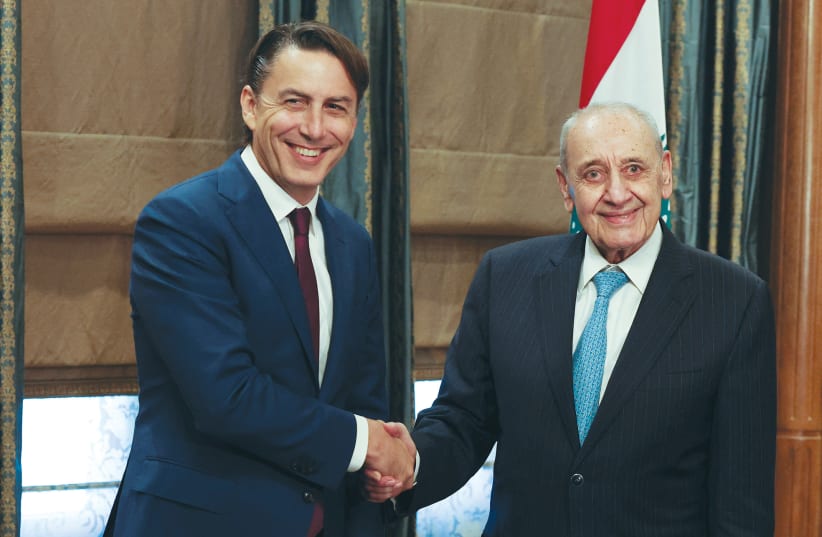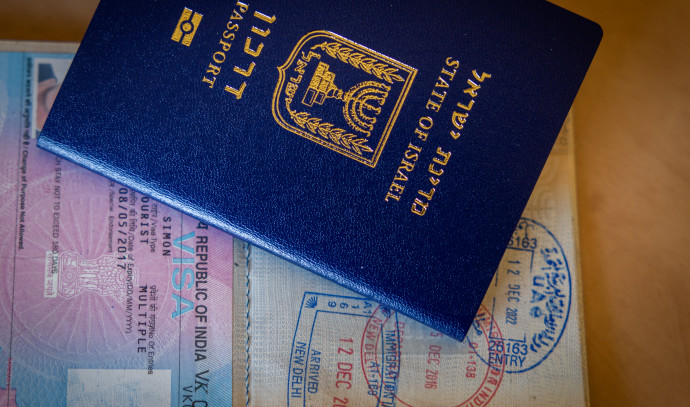ARTICLE AD BOX
Lebanon is at a crossroads. This election offers a chance for the country to reclaim sovereignty, strengthen state institutions, and ensure significant foreign aid.
By HERB KEINON JANUARY 8, 2025 21:40 Updated: JANUARY 8, 2025 21:56 US SPECIAL ENVOY Amos Hochstein (left) meets with Lebanese Parliament Speaker Nabih Berri in Beirut.
(photo credit: MOHAMED AZAKIR/REUTERS)
US SPECIAL ENVOY Amos Hochstein (left) meets with Lebanese Parliament Speaker Nabih Berri in Beirut.
(photo credit: MOHAMED AZAKIR/REUTERS)
By decimating Hezbollah, weakening Iran, and indirectly contributing to Bashar Assad’s ouster in Syria, Israel has gifted Lebanon with an opportunity to reclaim its sovereignty. Whether Lebanon can seize this moment will be tested on Thursday when its Parliament convenes for the 13th time in over two years to attempt to elect a new president.
The election, called for by Lebanese Parliament Speaker Nabih Berri of Amal, a faction allied with Hezbollah, immediately after the ceasefire with Israel went into effect on November 27, comes at a critical juncture and indicates a desire to put an end to the logjam that has prevented the country from voting in a president.
A newly elected president could play a key role in ensuring the continued implementation of the ceasefire, which calls for Hezbollah to cease operations against Israel and to move north of the Litani River, for Israel to withdraw from Lebanese territory, and for the Lebanese Army – along with the United Nations Interim Force in Lebanon (UNIFIL) – to take control of southern Lebanon where Hezbollah long held sway. The 60-day ceasefire is set to end on January 26.
A new president committed to implementing these terms could steer Lebanon toward stability and reinforce the fragile truce.
Lebanon has been without a president since October 2022, with Parliament – roughly divided into pro- and anti-Hezbollah camps – unable to reach an agreement the previous 12 times because of a lack of consensus and an inability to compromise.
As a result, the country – already grappling with severe economic and political crises even before Hezbollah began firing missiles, rockets, and drones at Israel in October 2023 – is now governed by an interim administration.
Without a president, Lebanon cannot appoint a new prime minister, leaving it governed by a caretaker government and paralyzed at a moment when international support, including massive financial support, hinges on functional governance. This financial support, including a massive agreement with the International Monetary Fund, is more crucial now than even before the war since the reconstruction costs in Lebanon – in Beirut as well as in southern Lebanon – are staggering.
In a sign of the changing strategic landscape, a Saudi delegation was in Beirut this week to discuss the elections with Lebanese officials, something not seen in the past when Iran was the outside force with the most sway.
Previous election attempt
The last time Lebanon’s Parliament tried to elect a president was in June 2023, with Hezbollah’s candidate being Suleiman Franjieh, a former lawmaker and ally of Assad. He is not believed to be in the running this time.
Instead, the leading candidate is Joseph Aoun, the commander of the Lebanese Army, who is being supported by the US and whose candidacy is bolstered by his image as a unifying, patriotic figure. His election could signal stronger state control over national security.
Stay updated with the latest news!
Subscribe to The Jerusalem Post Newsletter
On a recent visit to Saudi Arabia, which is also believed to be backing his candidacy, Aoun said he did not intend to confront Hezbollah. Hezbollah has indicated it would not use the veto power it has in Parliament to prevent his election.
Other top challengers are International Monetary Fund Middle East Director Jihad Azour, a former finance minister, and Samir Geagea, the leader of the Lebanese Christian Forces Party, but both are opposed by Hezbollah, which, while severely weakened, still has considerable parliamentary power.
The Lebanese presidency holds both symbolic and constitutional importance. According to the Taif Agreement of 1989, the president is the head of state and supreme commander of the armed forces. Executive power, however, is in the hands of government ministers.
Nevertheless, the president, if he chooses, could play a key role in shaping military and foreign policy, including efforts to disarm Hezbollah. According to Lebanon’s constitutional framework, the president must be a Maronite Christian, the prime minister a Sunni Muslim, and the speaker of the Parliament a Shia Muslim.
The 128-seat Parliament selects the president, and a two-thirds majority of 86 members must be present for the election to take place. In the first round, a candidate must secure 86 votes to win. In subsequent rounds, a minimum of 65 votes is necessary. No single political alliance holds enough seats to impose its choice, and because of Hezbollah’s strength in the Parliament, no candidate will be elected without its agreement.
For Israel, the outcome of Lebanon’s presidential election carries significant implications.
A president aligned with reformist forces could bolster the Lebanese Army’s presence in the south, limiting Hezbollah’s operational freedom and reinforcing the ceasefire.
Hezbollah may go along with such a candidate, knowing that the reconstruction of Lebanon will only happen with massive aid from abroad, and this will only come about with the type of political stability that a president can help provide. Hezbollah’s sponsor, Iran, is in no position to pour the kind of money into Lebanon that will now be needed for reconstruction.
On the other hand, continued political paralysis or the election of a Hezbollah-backed figure could heighten tensions and risk renewed conflict.
Lebanon is at a crossroads. This election offers a chance for the country to reclaim sovereignty, strengthen state institutions, and ensure significant foreign aid. Whether it takes that path or remains mired in political paralysis and division will shape not only its future but also the fate of the fragile truce on the northern border.

 14 hours ago
9
14 hours ago
9








 English (US) ·
English (US) ·